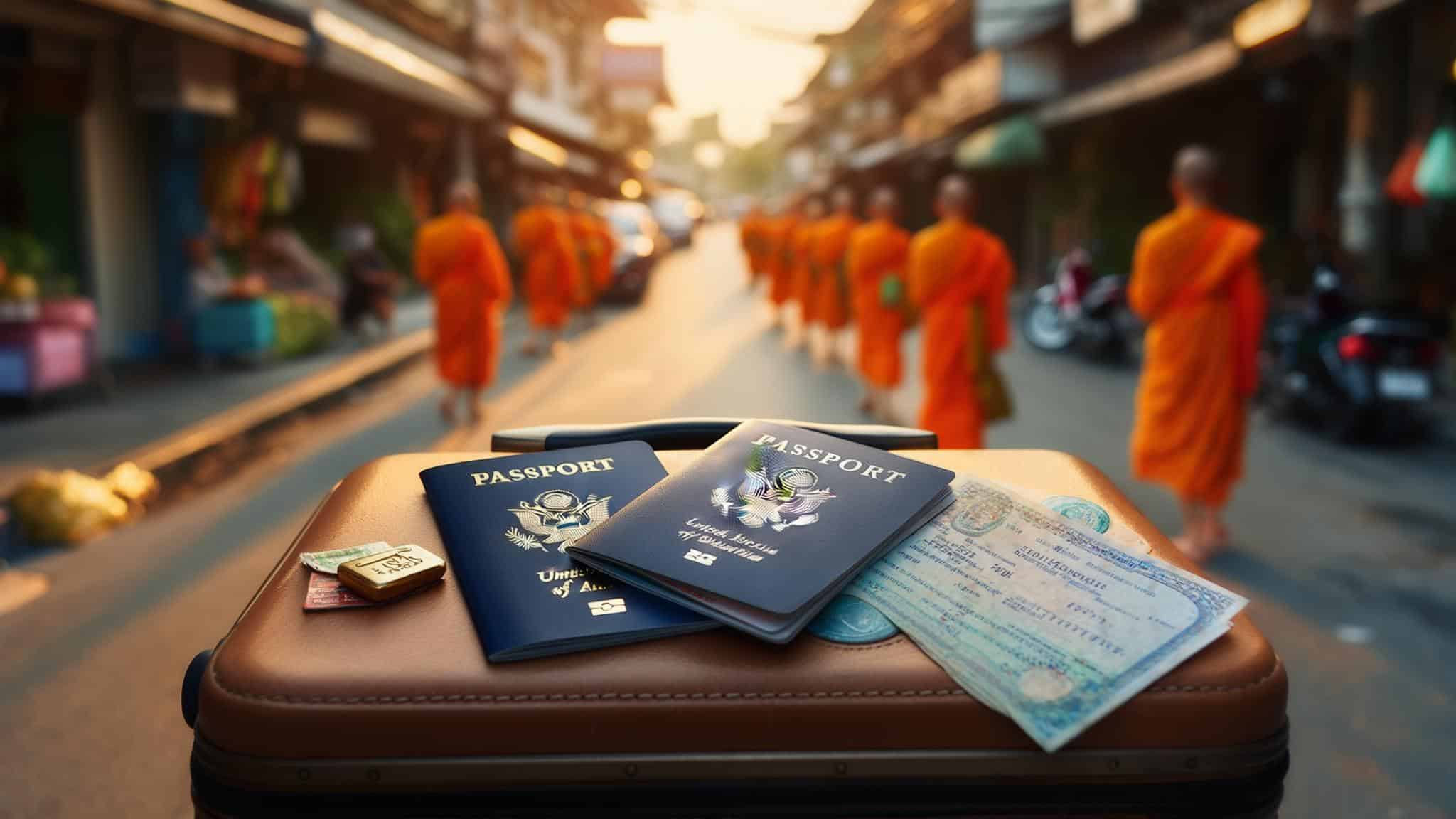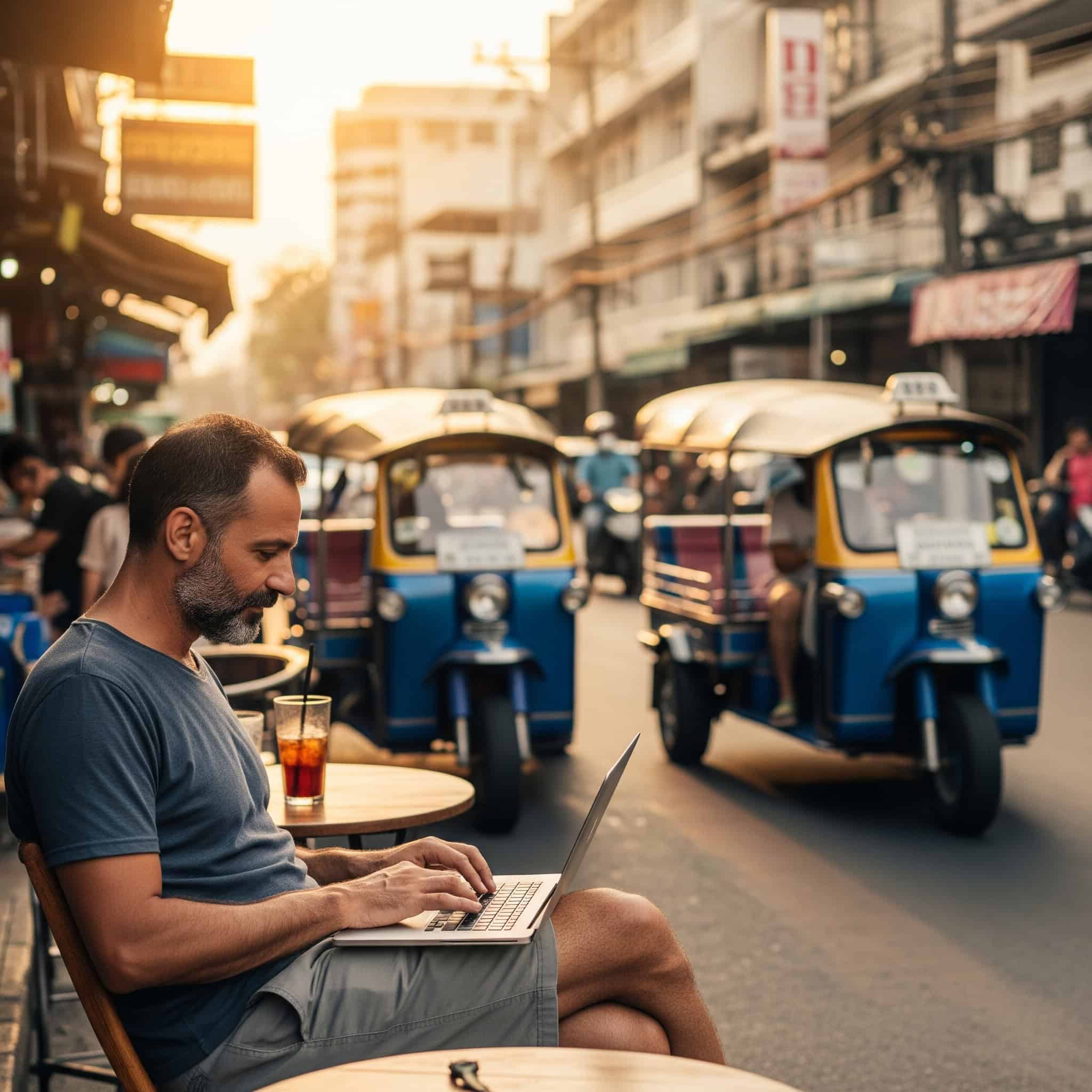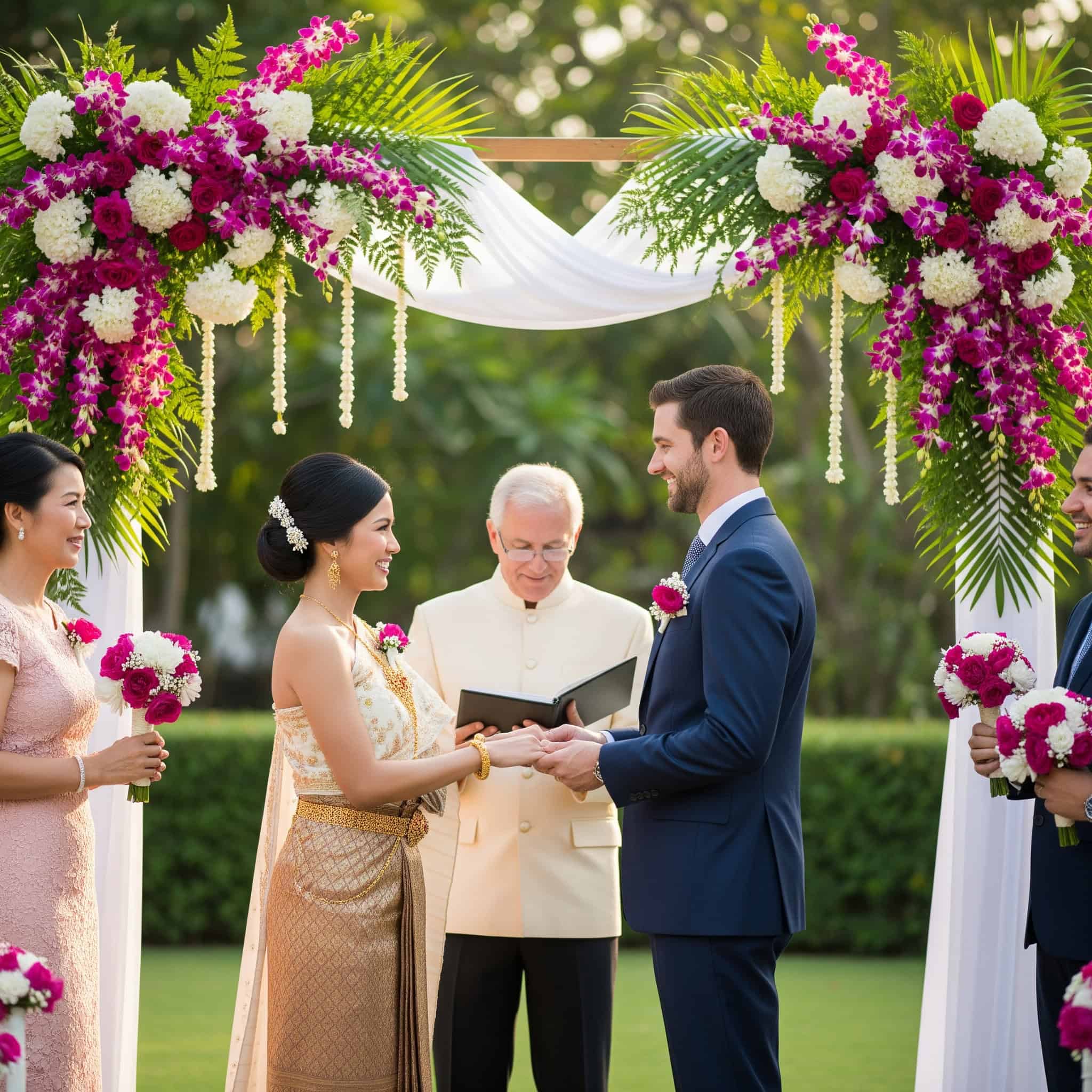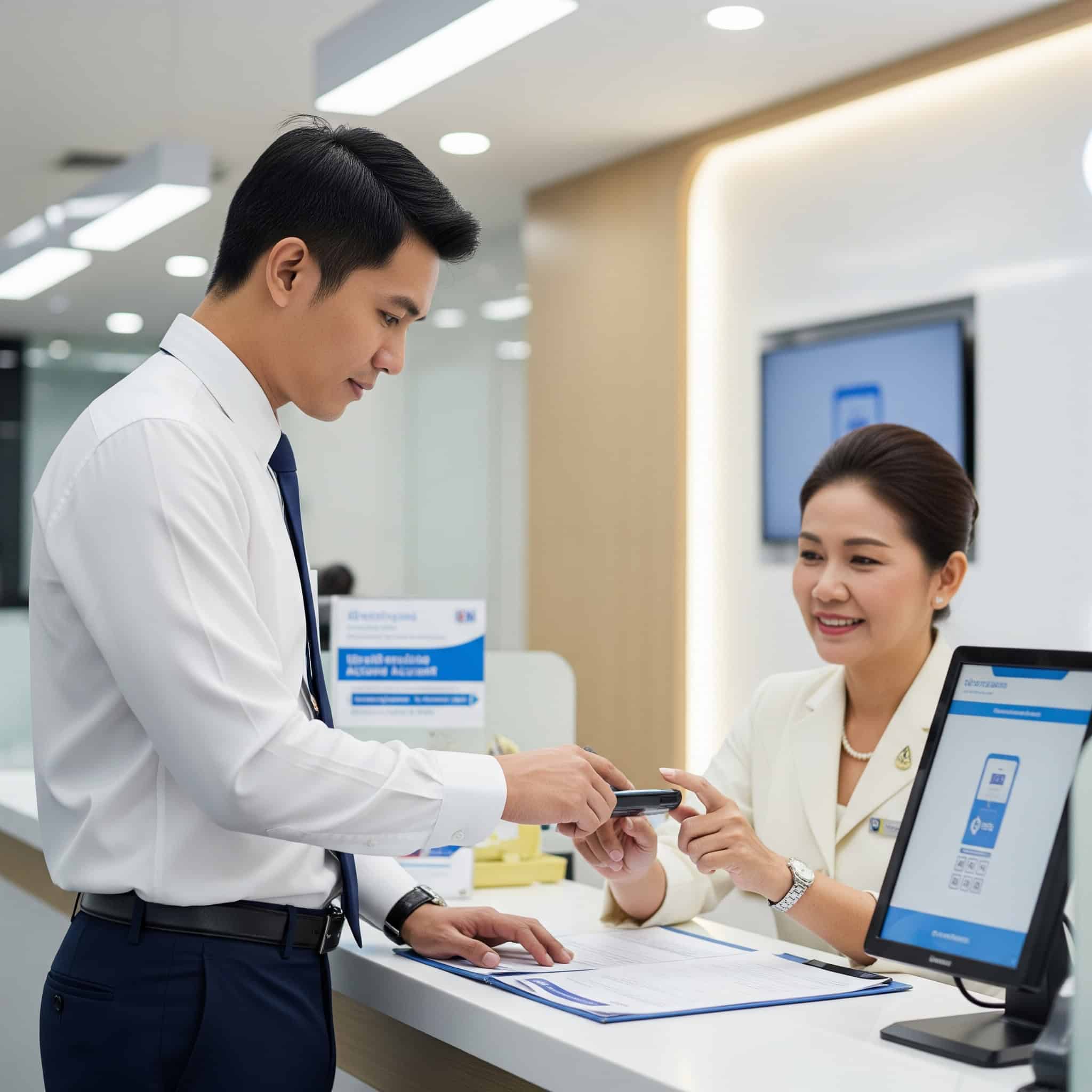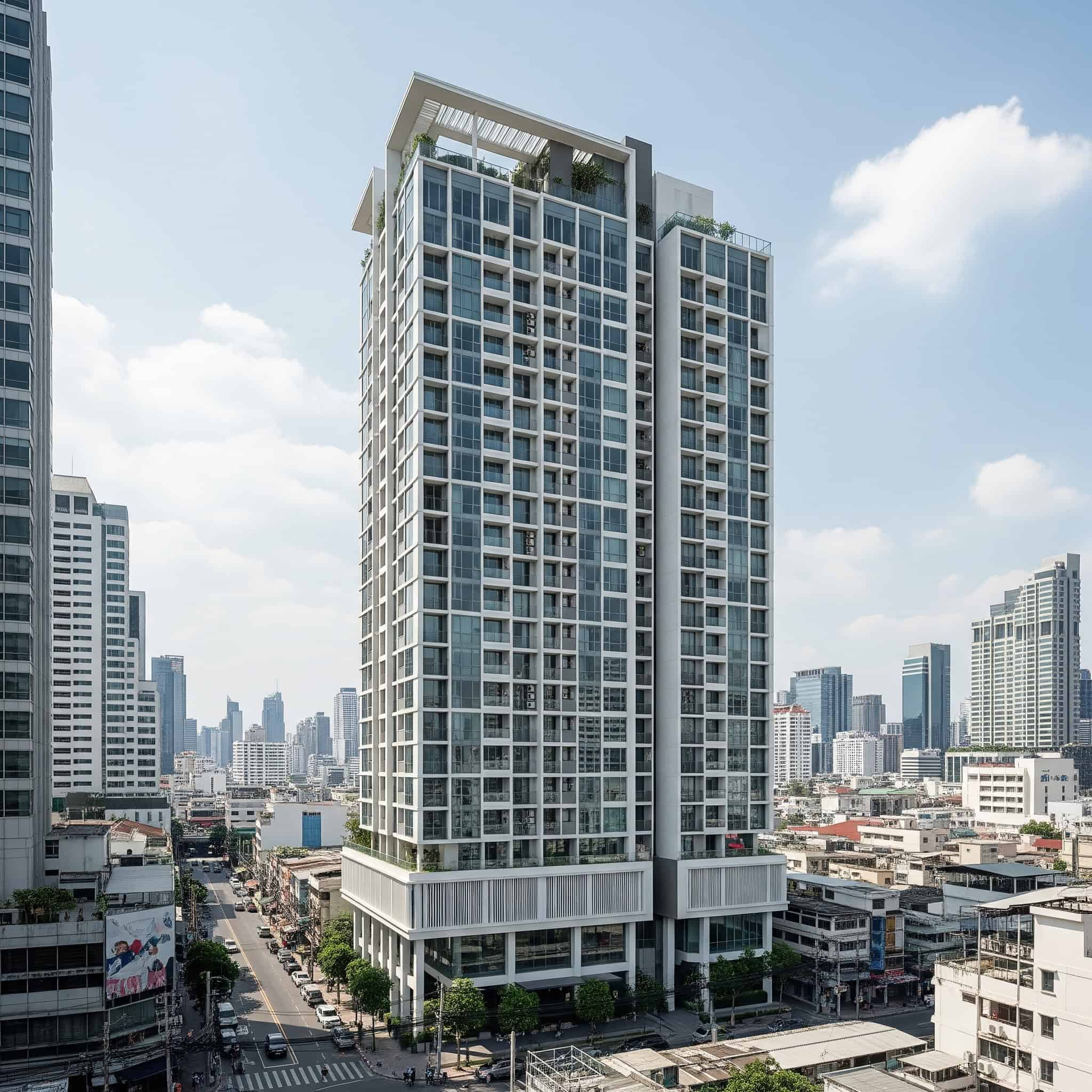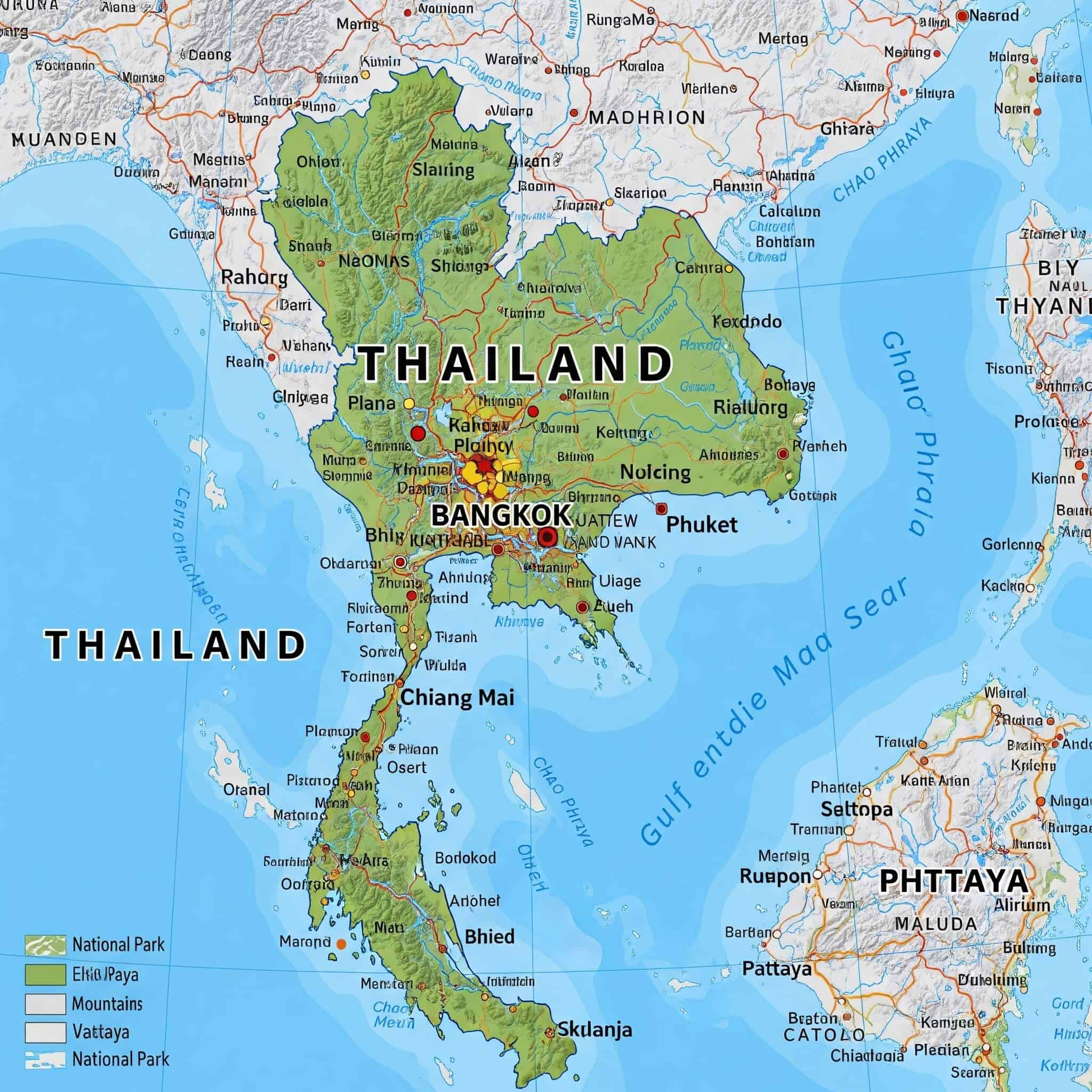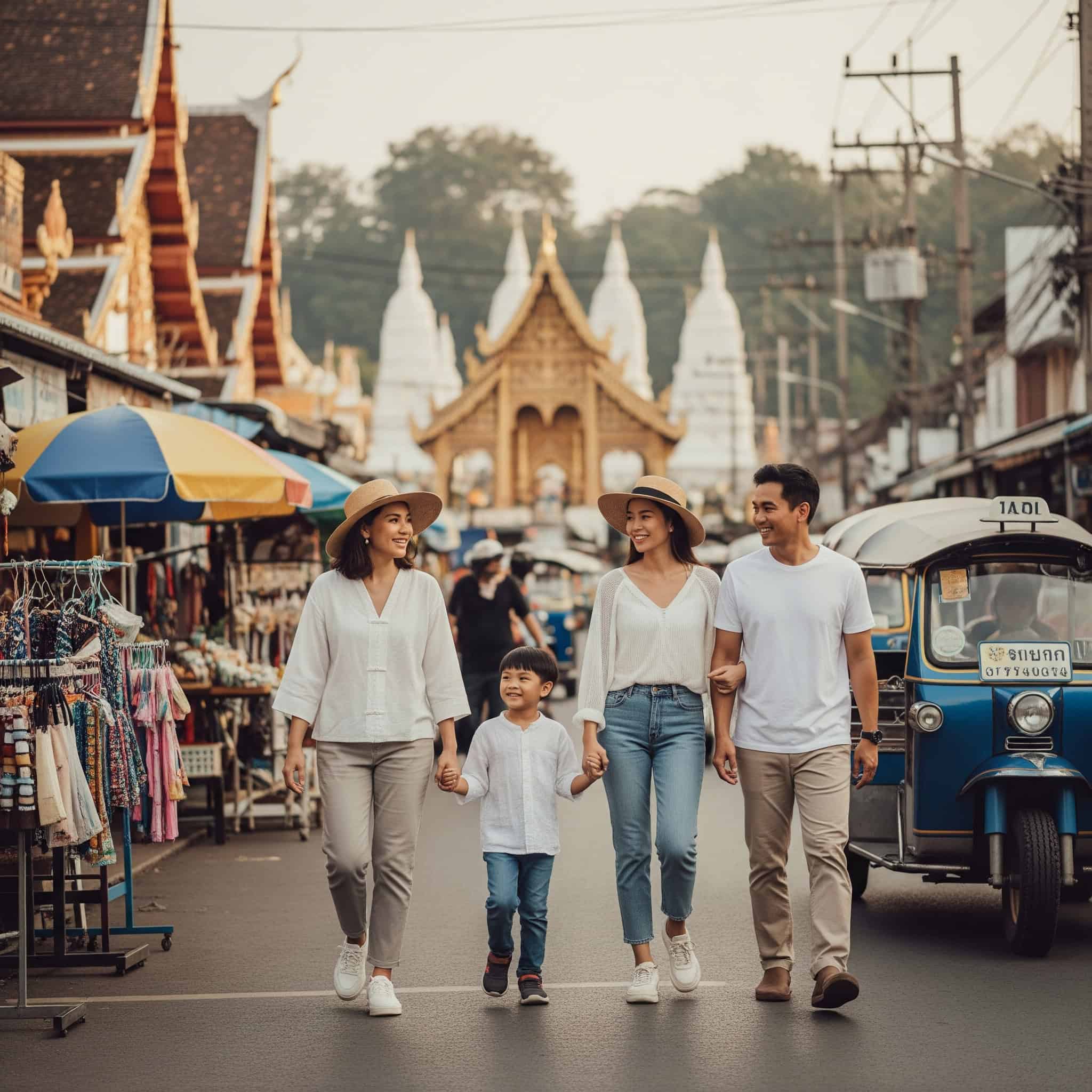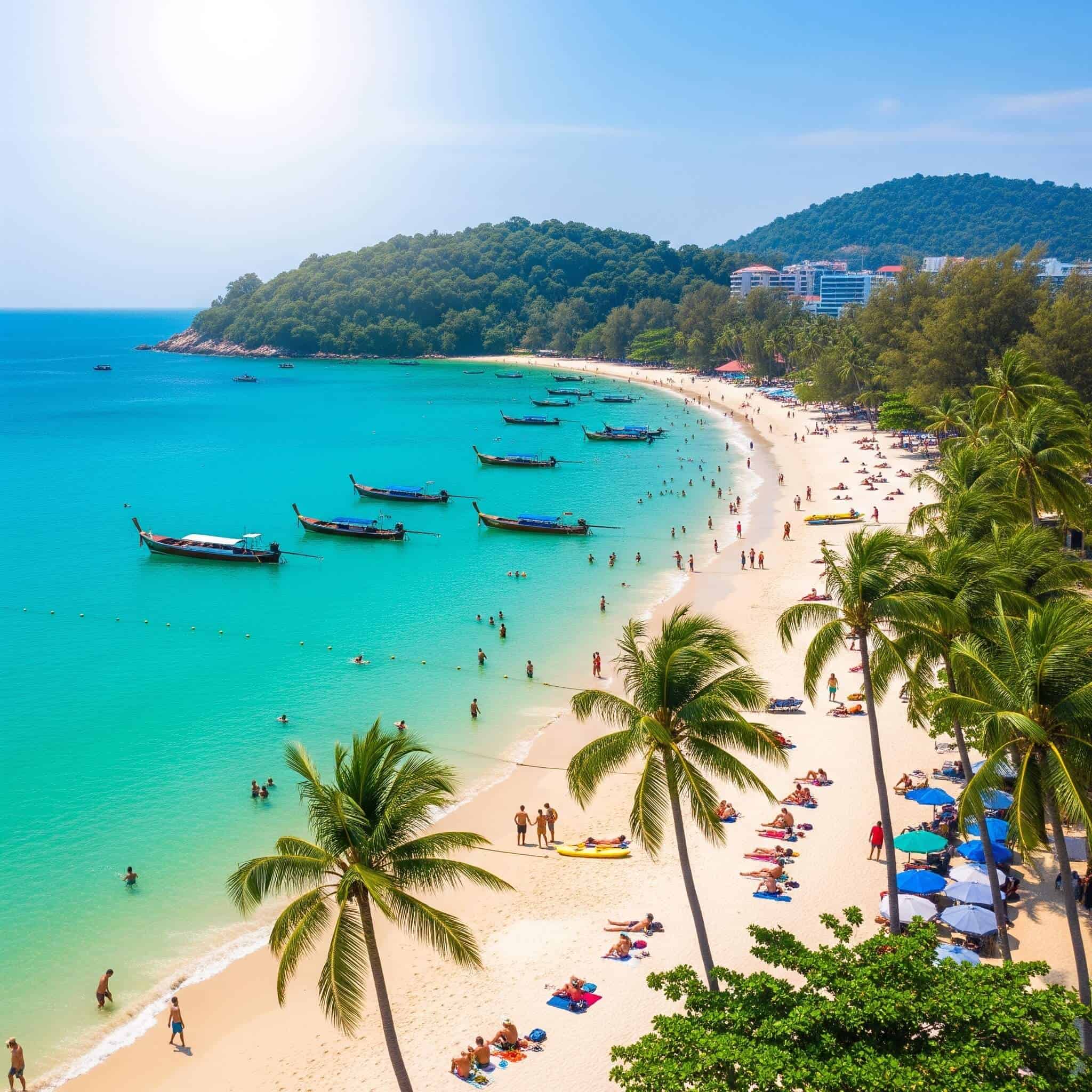Moving to Thailand from the US: 25 Essential Options for a Smooth Transition
According to recent data from the US State Department, over 8,000 Americans officially relocated to Thailand in 2022, with the actual number likely much higher due to unreported moves. I’ve spent countless hours researching this transition after my brother moved to Chiang Mai last year. His experience taught me that proper preparation makes all the difference between a stressful upheaval and an exciting new chapter. This comprehensive guide breaks down everything you need to know about moving to Thailand from US, covering visa options, financial considerations, location choices, cultural adaptation strategies, and essential logistics.
Thailand ranks among the top 10 destinations for American expatriates in Asia, with a 15% increase in US citizens seeking long-term visas since 2019. This trend shows no signs of slowing down as more Americans discover the benefits of Thai living.
The average cost difference between US and Thai living expenses ranges from 40-60% lower in Thailand, though this varies significantly by location and lifestyle choices. This dramatic cost reduction is a major draw for retirees, digital nomads, and anyone looking to stretch their dollars further.
Table of Contents
Considerations Before Moving to Thailand
Visa and Legal Considerations
Financial and Practical Preparations
Location Considerations
Cultural Adaptation
Logistics and Services
Connecting Your Move with Decluttering Services
Final Thoughts
Considerations Before Moving to Thailand
Before packing your bags for Thailand, several critical factors require careful evaluation. Thailand offers numerous benefits including lower living costs and beautiful surroundings, but the transition demands thorough preparation. You’ll need to understand visa requirements specific to your situation, assess your financial readiness, evaluate healthcare options since US coverage won’t extend internationally, prepare for significant cultural differences, research practical logistics like housing and banking, and develop contingency plans for emergencies or if your Thailand experience doesn’t meet expectations.
The minimum financial requirements for most long-term Thai visas include either 800,000 THB (~$25,000) in a Thai bank account or documented monthly income of at least 65,000 THB (~$2,000). These requirements aren’t just bureaucratic hurdles—they’re designed to ensure you can support yourself without becoming a burden on the Thai system.
Thailand’s healthcare system ranks 47th globally according to WHO metrics, with private hospitals in major cities meeting international standards while rural healthcare access remains limited. This disparity means your location choice within Thailand significantly impacts your healthcare options.
Many Americans who move to Thailand find that proper preparation in these areas significantly reduces stress during the transition. I recommend creating a detailed checklist and timeline to ensure you don’t overlook critical steps.
Pre-Move Checklist | Timeframe | Priority Level |
|---|---|---|
Research visa options | 6-12 months before | Critical |
Financial assessment | 6-12 months before | Critical |
Healthcare planning | 3-6 months before | High |
Housing research | 3-6 months before | High |
Cultural preparation | Ongoing | Medium |
Banking arrangements | 1-3 months before | High |
Emergency planning | 1-2 months before | Medium |
If you’re planning to move to Thailand, you’ll likely need to declutter your home before departure. Our guide on rental home cleanouts offers practical strategies for efficiently preparing your property, whether you’re planning to rent it out or sell it during your time abroad.
Visa and Legal Considerations
1. Retirement Visa (Non-Immigrant O-A)
The Retirement Visa provides a stable long-term option for Americans aged 50 and older looking to spend their retirement years in Thailand. You’ll need to demonstrate financial stability through either a Thai bank deposit of 800,000 THB (approximately $25,000) or monthly income of 65,000 THB (around $2,000). This visa remains valid for one year with extension possibilities, though you must report to immigration every 90 days to maintain status.
The O-A visa application requires a criminal background check from your home country, medical certification including tests for leprosy, tuberculosis, elephantiasis, and drug addiction. These medical requirements might seem excessive, but they’re non-negotiable parts of the process.
Recent regulatory changes now require O-A visa holders to maintain Thai health insurance with minimum coverage of 400,000 THB for inpatient care and 40,000 THB for outpatient treatment. This insurance requirement has become a significant consideration for older retirees, as premiums increase substantially with age.
This option works well for retirees with modest but stable financial resources who want to legally reside in Thailand long-term. I’ve spoken with dozens of American retirees in Thailand who find this visa option straightforward once they understand the requirements.
2. Elite Visa Program
The Thailand Elite Visa offers a premium, hassle-free option for those willing to pay for convenience. Programs range from 5-20 years with corresponding fees between 600,000-2,000,000 THB ($19,000-$63,000). Your investment provides VIP treatment including airport fast-track service, government liaisons to handle paperwork, and special discounts at partner establishments.
The Elite Visa program operates through Thailand Privilege Card Company Limited, a state-owned enterprise under the Tourism Authority of Thailand. This official backing ensures the program’s legitimacy and stability.
Members receive additional benefits including complimentary annual health check-ups, golf course access, spa treatments, and priority services at participating hospitals depending on the specific package selected. These perks can add significant value beyond the visa itself.
This visa eliminates the need for regular visa runs or complex documentation, making it ideal for those who prioritize convenience and have the financial means to invest in a streamlined experience. I’ve met several Elite Visa holders who swear the upfront cost is worth every penny for the headaches it prevents.
3. Digital Nomad/Smart Visa
Thailand’s Smart Visa program caters to remote workers, entrepreneurs, and highly skilled professionals. You’ll need to provide proof of employment and meet minimum income requirements (typically $80,000 annually for certain categories). This visa offers significant advantages including work authorization without separate permits and reduced 90-day reporting requirements.
The Smart Visa program divides applicants into five categories: T (Talent), I (Investor), E (Executive), S (Startup), and O (Other family members). Each category has specific eligibility criteria and benefits tailored to different professional situations.
Qualification criteria include employment with companies in Thailand’s targeted industries or verification of specialized expertise with minimum salary thresholds varying by category. The documentation requirements can be substantial, but the benefits justify the effort for qualified applicants.
The program continues evolving to attract global talent, with recent updates making it more accessible to digital professionals who can work from anywhere while contributing to Thailand’s economy. I’ve watched this visa option develop over the past few years, and it’s becoming increasingly viable for location-independent professionals.
4. Education Visa
The Education Visa provides a pathway for Americans interested in studying Thai language, Muay Thai, cooking, or pursuing formal education at Thai institutions. You must enroll in government-approved programs that meet minimum course hour requirements. This visa allows cultural immersion while maintaining legal status, with extensions granted based on your academic progress.
Education visa holders must attend a minimum of 8 hours of classes weekly (or equivalent) and pass periodic progress assessments to qualify for extensions. These requirements are increasingly enforced, so this isn’t a “visa mill” option.
The maximum duration for language study visas has been reduced in recent years to discourage visa abuse, with most programs limited to 1-2 years total duration. This change reflects Thailand’s efforts to ensure education visas are used for genuine study purposes.
Many language schools specifically cater to foreigners seeking this visa, offering flexible schedules while ensuring you meet the requirements for legal stay. I’ve found that the education visa offers excellent value for those genuinely interested in learning Thai language or culture.
5. Marriage Visa
For Americans married to Thai citizens, the Marriage Visa provides a stable long-term option with reasonable financial requirements. You’ll need either a 400,000 THB bank deposit or documented monthly income of 40,000 THB. The visa requires annual renewal and 90-day reporting to immigration.
Marriage visa applications require documentation of the relationship including marriage certificates recognized by both Thai and US authorities. The paperwork can be substantial, but it’s manageable with proper preparation.
Recent regulatory changes have increased scrutiny of marriage visas, with immigration officials sometimes conducting home visits or interviews to verify legitimate relationships. These measures aim to prevent visa abuse through sham marriages.
You must maintain proper marriage documentation and demonstrate the relationship’s legitimacy. This option works well for those with Thai spouses, providing a clear path to long-term residency while acknowledging the family connection to Thailand. I know several mixed Thai-American couples who find this visa straightforward to maintain.
Visa Type | Age Requirement | Financial Requirement | Duration | Key Benefits |
|---|---|---|---|---|
Retirement (O-A) | 50+ | 800,000 THB deposit or 65,000 THB monthly income | 1 year, renewable | Long-term residence for retirees |
Elite | None | 600,000-2,000,000 THB fee | 5-20 years | Convenience, VIP services, no reporting |
Smart | None | Varies by category (typically $80,000/year) | 4 years, renewable | Work authorization, reduced reporting |
Education | None | Varies by institution | Course duration | Cultural immersion, legal stay during studies |
Marriage | None | 400,000 THB deposit or 40,000 THB monthly income | 1 year, renewable | Family-based long-term residence |
Financial and Practical Preparations
6. Banking Setup
Establishing proper banking arrangements forms a crucial part of your Thailand transition. You’ll want to maintain US accounts while opening Thai bank accounts at institutions like Bangkok Bank, Kasikorn, or SCB, which have experience working with expatriates. Required documentation typically includes your passport, visa, proof of address, and sometimes reference letters.
Bangkok Bank’s New York branch offers a direct connection for Americans, allowing easier account opening in Thailand through their “Bangkok Bank Global ID” program. This unique service can save significant time and frustration during your initial banking setup.
Thai banks typically restrict certain account features for non-permanent residents, including daily withdrawal limits (often 50,000-200,000 THB) and online banking transaction maximums. Understanding these limitations helps avoid surprises when managing your finances.
Focus on banks offering robust English-language services and efficient international transfer capabilities to maintain connections with your US finances. Many expats find maintaining accounts in both countries essential for managing ongoing financial obligations. I recommend keeping at least one US credit card active to maintain your credit history back home.
7. Tax Planning
Tax obligations become complicated when moving to Thailand, as US citizens must continue filing taxes regardless of residence. The Foreign Earned Income Exclusion can exempt up to approximately $120,000 of foreign earnings from US taxation. Meanwhile, Thailand taxes residents on income sourced within the country, creating potential double taxation issues.
The US-Thailand Tax Treaty provides limited protection against double taxation but does not eliminate filing requirements for US citizens. This treaty has specific provisions that a qualified tax professional can help you navigate.
Thailand’s personal income tax operates on a progressive scale from 0-35%, with non-resident taxpayers subject to a flat 15% withholding tax on Thailand-sourced income. Understanding which category you fall into is essential for proper tax planning.
Working with tax specialists familiar with both US and Thai tax systems proves essential for optimizing your tax situation and ensuring compliance with both countries’ requirements. I can’t stress enough how important professional tax guidance is for Americans abroad.
Sarah, a web developer earning $95,000 annually while working remotely from Chiang Mai, qualifies for the Foreign Earned Income Exclusion by meeting the Physical Presence Test (staying in Thailand for 330+ days in a 12-month period). She files Form 2555 with her US tax return, excluding her entire income from US taxation. However, since she performs work while physically in Thailand, she must register with the Thai Revenue Department and pay Thai income tax on this income at progressive rates. To optimize her situation, she consulted with a tax specialist who helped her properly document her tax home and establish a filing system that satisfies both US and Thai requirements, ultimately saving her approximately $15,000 in potential double taxation.
8. Healthcare Arrangements
Healthcare planning requires careful consideration when moving to Thailand. Private insurance options from providers like AXA, Cigna, and BUPA offer expat-specific plans ranging from $1,000-4,000 annually depending on your age and desired coverage level. Government regulations now require O-A visa holders to maintain minimum coverage of 400,000 THB for hospitalization.
Thailand’s private hospitals in major cities (particularly Bangkok, Chiang Mai, and Phuket) are JCI-accredited with international standard care, while public hospitals vary significantly in quality and English-language capabilities. This two-tier system means your healthcare experience can differ dramatically depending on your insurance coverage.
Age-based restrictions become significant for expatriate health insurance, with many policies capping new enrollment at age 70-75 and premiums increasing substantially after age 60. This is a critical consideration for older expatriates planning their move.
When evaluating plans, consider coverage for both routine care and emergency evacuation options, particularly if you’ll live outside major urban centers where medical facilities may be limited. I recommend obtaining quotes from multiple providers and carefully comparing coverage details before making a decision.
When organizing your healthcare documents before moving to Thailand, keeping everything properly sorted is essential. Our article on decluttering guide provides practical techniques for organizing important paperwork that you’ll need during your international transition.
9. Housing Options
Thailand offers diverse housing options for expatriates with varying budgets and preferences. Condominiums represent the only property type foreigners can own outright, with prices ranging from $50,000 to $500,000+ depending on location and amenities. Rental properties cost between $300-1,500 monthly in most areas, with premium locations in Bangkok or beach resorts commanding higher prices.
Foreign ownership of condominiums is restricted to buildings where foreigners own no more than 49% of the total unit space. This legal limitation means popular expatriate areas can sometimes have limited availability of foreign-quota units.
Land ownership requires either a Thai Limited Company structure (with specific ownership percentage requirements) or a long-term leasehold arrangement, typically structured as 30-year terms with renewal options. These alternatives to direct ownership have their own complexities and risks that require careful legal guidance.
When selecting housing, consider lease terms, utility arrangements, and proximity to essential services. Many expatriates initially rent to better understand their preferred neighborhoods before making purchasing decisions. I’ve found that spending at least 3-6 months renting before buying property gives you invaluable local knowledge.
10. Shipping and Storage Solutions
Transporting possessions to Thailand requires weighing several options. Full container shipping costs between $5,000-10,000 from the US to Thailand, with partial shipments available at lower price points. Many expatriates find selling possessions and purchasing new items in Thailand more cost-effective, particularly for furniture and household goods.
Import duties on personal effects can range from 20-60% of declared value for items less than 6 months old, making new purchases particularly expensive to import. These duties can dramatically increase the cost of bringing newer items with you.
Shipping transit times typically range from 6-10 weeks door-to-door from the US East Coast to Thailand, with West Coast shipments averaging 4-8 weeks. This lengthy timeline requires careful planning for what you’ll need immediately upon arrival.
For items with sentimental value or that you’re not ready to part with, storage options in the US provide a middle-ground solution while you establish your new life abroad. I recommend carefully evaluating what’s truly worth shipping versus what can be replaced locally.
Before you move to Thailand, properly managing your excess belongings is crucial. For those with substantial furniture collections, our guide on used furniture pickup disposal offers eco-friendly solutions for items you won’t be taking overseas.
Location Considerations
11. Bangkok Urban Living
Thailand’s capital offers a comprehensive urban experience with modern amenities, diverse international communities, world-class healthcare, and abundant business opportunities. You’ll find Bangkok requires a higher budget ($1,500-3,000 monthly for a comfortable lifestyle) but provides extensive infrastructure including public transportation, international schools, and cultural attractions.
Bangkok’s BTS Skytrain and MRT subway systems continue expanding, with current coverage of 53 stations across 43.5 kilometers and planned extensions adding 30+ stations by 2025. This growing transit network makes car-free living increasingly viable in many parts of the city.
The city experiences significant air quality challenges during certain seasons, with PM2.5 levels frequently exceeding WHO guidelines between December and April. This seasonal air pollution is an important health consideration, particularly for those with respiratory conditions.
The city works particularly well for career-focused individuals seeking cosmopolitan living, though you’ll contend with traffic congestion and typical urban challenges. Different neighborhoods cater to various preferences, from the expatriate enclaves of Sukhumvit to more authentic Thai experiences in other districts. I’ve found that neighborhood selection dramatically impacts your Bangkok experience—research thoroughly before committing to a specific area.
12. Chiang Mai Northern Culture Hub
Chiang Mai has become a popular expatriate destination thanks to its temperate climate, rich cultural attractions, and lower cost of living ($1,000-2,000 monthly). The city hosts a thriving digital nomad community with numerous coworking spaces and networking opportunities. You’ll find Chiang Mai offers an appealing balance of authentic Thai culture and Western conveniences, with excellent healthcare options at facilities like Chiang Mai Ram Hospital.
Chiang Mai’s seasonal burning season (typically February-April) creates significant air quality concerns, with PM2.5 levels sometimes exceeding 150 μg/m³ (WHO guideline: 25 μg/m³). Many expatriates choose to travel during these months to avoid the worst air quality periods.
The city’s digital infrastructure includes fiber internet availability with average speeds of 100-300 Mbps in most areas and 5G coverage throughout the central districts. This robust connectivity makes Chiang Mai particularly attractive to remote workers and digital entrepreneurs.
The surrounding mountains provide recreational opportunities while the historic old city contains hundreds of temples and cultural sites. I’ve spent considerable time in Chiang Mai and find its combination of traditional culture, natural beauty, and modern amenities hard to beat for overall quality of life.
13. Phuket Island Living
Phuket offers resort-style island living with beautiful beaches, an international atmosphere, and well-developed infrastructure. The cost of living exceeds mainland prices ($1,500-3,000 monthly) with seasonal fluctuations during peak tourism periods. The island particularly suits ocean enthusiasts and those seeking an active lifestyle with water sports, hiking, and outdoor activities available year-round.
Phuket’s water supply infrastructure remains challenging in some areas, with seasonal shortages common and many properties relying on delivered water during dry periods. This practical consideration affects daily life more than you might expect.
The island’s economy depends heavily on tourism (directly accounting for 40% of GDP), creating vulnerability to seasonal fluctuations and global travel disruptions. This economic reality impacts everything from rental prices to job opportunities.
While somewhat isolated from mainland resources, Phuket International Airport provides convenient connections to Bangkok and international destinations. Different beaches and communities offer varying atmospheres from bustling tourist centers to quieter local villages. I recommend exploring multiple areas of the island before deciding where to settle.
14. Hua Hin Retirement Haven
Hua Hin has developed into a popular retirement destination thanks to its relaxed atmosphere, championship golf courses, and quality healthcare facilities. The moderate cost of living ($1,200-2,500 monthly) and growing expatriate infrastructure make daily life convenient while maintaining Thai cultural authenticity.
Hua Hin’s microclimate receives significantly less rainfall than other Thai coastal areas (averaging 968mm annually compared to Phuket’s 2,220mm), creating a drier, more consistent climate. This weather pattern is particularly appealing to those seeking to avoid the intense monsoon seasons found elsewhere.
The region’s healthcare infrastructure centers around Bangkok Hospital Hua Hin, which maintains JCI accreditation and specialized departments catering to the area’s significant retirement population. This medical facility provides reassurance for older expatriates concerned about healthcare access.
The royal family’s connection to Hua Hin ensures the city remains well-maintained with excellent beaches and public spaces. You’ll find a good balance of Thai culture and Western amenities, with enough English spoken to ease daily interactions while still providing an authentic experience. I’ve noticed Hua Hin strikes an excellent balance between accessibility and authenticity.
15. Isaan Authentic Experience
Thailand’s northeastern Isaan region offers the most authentic Thai living experience at the lowest cost ($500-1,200 monthly). You’ll encounter fewer expatriates and English speakers, requiring deeper cultural immersion and language acquisition. While international amenities remain limited, the region provides genuine Thai experiences with exceptionally friendly communities.
Isaan’s agricultural economy produces 80% of Thailand’s jasmine rice and maintains distinct culinary traditions influenced by Laotian and Khmer cultures. This cultural distinctiveness makes Isaan particularly interesting for those seeking to experience “real Thailand.”
The region experiences the most extreme seasonal temperature variations in Thailand, with summer highs regularly exceeding 40°C (104°F) and cool season lows dropping to 15°C (59°F). This climate requires adaptation strategies different from Thailand’s more temperate or tropical regions.
Cities like Khon Kaen and Udon Thani offer some Western conveniences while smaller towns provide complete cultural immersion. This option suits those seeking authentic connections with Thai culture and comfortable living on minimal budgets. I’ve met several expatriates who initially planned short stays in Isaan but fell in love with the region’s authenticity and warmth.
Location | Monthly Budget | Expat Presence | Healthcare | Internet | Climate | Best For |
|---|---|---|---|---|---|---|
Bangkok | $1,500-3,000 | Very High | Excellent | Excellent | Hot, Urban | Professionals, Urban Lifestyle |
Chiang Mai | $1,000-2,000 | High | Very Good | Excellent | Mild, Seasonal Smog | Digital Nomads, Cultural Enthusiasts |
Phuket | $1,500-3,000 | High | Good | Good | Tropical, Rainy Season | Beach Lovers, Active Lifestyle |
Hua Hin | $1,200-2,500 | Medium | Good | Good | Dry, Consistent | Retirees, Golf Enthusiasts |
Isaan | $500-1,200 | Low | Limited | Variable | Hot, Seasonal | Cultural Immersion, Budget Living |
Cultural Adaptation
16. Language Learning Options
Developing Thai language skills significantly enhances your Thailand experience. Formal courses at universities like Chulalongkorn or dedicated language schools cost between 10,000-30,000 THB per course and provide structured learning environments. Private tutors (300-800 THB hourly) offer personalized instruction tailored to your learning style and schedule.
Thai language presents five distinct tones (mid, low, falling, high, rising) that change word meanings, making pronunciation particularly challenging for English speakers. This tonal system requires dedicated practice but becomes more intuitive over time.
The Thai script consists of 44 consonants, 15 vowel symbols that combine into 28 vowel forms, and 4 tone marks, with no spaces between words in written sentences. While learning to read Thai seems daunting initially, it dramatically improves your ability to navigate daily life.
Online platforms like ThaiPod101 or language exchange meetups provide flexible alternatives. While English works in tourist areas and international settings, even basic Thai proficiency improves daily interactions, demonstrates respect for local culture, and opens doors to deeper connections with Thai people. I’ve found that learning just 100 common Thai phrases transforms your daily experience.
Michael, a software engineer who relocated to Bangkok, initially struggled with cultural isolation despite living in an expatriate-heavy neighborhood. After six months of minimal progress integrating with Thai society, he enrolled in a twice-weekly Thai language course at a local language school. The structured program cost 25,000 THB for a three-month course. While his speaking remained basic, even limited Thai vocabulary dramatically changed his daily experiences. Local vendors at his neighborhood market began greeting him warmly, offering cooking suggestions, and occasionally giving him extra items. His apartment building staff started inviting him to building events, and his Thai colleagues began including him in lunch outings where they would patiently help him practice. The language investment created a social bridge that transformed his Thailand experience from isolated observation to active participation.
17. Cultural Training Programs
Formal cultural training accelerates your adaptation to Thai society. Relocation companies offer orientation services with comprehensive cultural briefings (30,000-50,000 THB) covering essential aspects of Thai society. Community workshops through expatriate organizations provide more affordable options for learning Thai customs and etiquette.
Thai social structure incorporates the concept of “kreng jai” (เกรงใจ), an untranslatable term encompassing deference, consideration, and reluctance to impose or cause discomfort. Understanding this concept helps navigate many seemingly confusing social situations.
Non-verbal communication carries significant weight in Thai culture, with specific meanings attached to gestures involving the head, feet, and hands that differ substantially from Western norms. Learning these non-verbal cues prevents unintentional offense in daily interactions.
Understanding fundamental concepts like “saving face,” hierarchy, and appropriate public behavior proves crucial for successful integration. These programs help prevent unintentional cultural missteps that could damage relationships or create unnecessary difficulties in your new environment. I highly recommend some form of cultural training, whether formal or informal, before and during your early months in Thailand.
18. Social Integration Strategies
Building a social network in Thailand requires intentional effort. Expatriate groups like Internations, Meetup.com events, and Facebook communities for Americans in Thailand provide immediate connections with others sharing similar experiences. Volunteer opportunities with local charities or teaching English build meaningful community connections while contributing positively.
Research indicates expatriates who develop friendships with host country nationals report 30-40% higher satisfaction rates and significantly lower culture shock symptoms. This research confirms what I’ve observed personally—those who build relationships with Thai locals have richer, more fulfilling experiences.
Thailand’s collectivist social structure emphasizes group harmony and indirect communication, requiring adjustment for Americans accustomed to individualistic and direct interaction styles. This cultural difference affects everything from workplace dynamics to casual social gatherings.
Sports clubs, hobby groups, and religious organizations welcoming both Thais and foreigners offer natural settings for relationship development. Creating a mixed social network improves cultural adaptation and establishes crucial support systems for navigating challenges in your new environment. I recommend pursuing at least one activity specifically designed to connect you with Thai locals.
19. Professional Networking
Maintaining professional connections proves essential for career continuity in Thailand. The American Chamber of Commerce in Thailand offers valuable business connections through membership ($500+ annually) and regular networking events. Industry-specific associations relevant to your field provide targeted professional development opportunities.
Thailand’s Foreign Business Act restricts foreign participation in certain industries, with work permits requiring employer sponsorship and demonstration that the position cannot be filled by a Thai national. Understanding these legal constraints helps set realistic professional expectations.
Professional hierarchy in Thai business contexts follows strict seniority principles, with business card exchange rituals and formal addressing conventions that differ significantly from American practices. Adapting to these business customs improves your professional effectiveness.
Coworking spaces in major cities host networking events and entrepreneur meetups particularly valuable for remote workers and business owners. These professional connections can lead to opportunities within Thailand’s growing economy while maintaining career momentum during your international experience. I’ve found professional networks particularly important for combating isolation when working remotely.
20. Family Adjustment Support
Relocating with family requires additional support systems. International schools for children ($10,000-25,000 annually) provide American or international curricula while facilitating cross-cultural friendships. Spouse programs through employers or expatriate organizations address trailing partner challenges including career interruption and social isolation.
Research on Third Culture Kids (children raised outside their parents’ culture) shows both challenges and benefits, with higher rates of identity complexity but also increased cultural adaptability and language acquisition. Children often adapt more quickly than adults but need support processing their unique experiences.
Trailing spouse syndrome affects 70-80% of accompanying partners, with career disruption and loss of professional identity requiring proactive intervention strategies. This issue frequently determines whether families remain in Thailand long-term.
Family counseling services specializing in expatriate adjustment issues help navigate the complex emotions of international relocation. Ensuring all family members successfully transition to Thai life proves critical for long-term satisfaction, as family adjustment difficulties represent the primary reason for premature returns to the US. I recommend regular family meetings to discuss adjustment challenges openly.
The Johnson family relocated from Seattle to Bangkok when David accepted an executive position with a multinational corporation. While David quickly adapted through workplace structure and support, his wife Jennifer and their two children (ages 8 and 12) struggled with the transition. After two months of increasing tension, they implemented a comprehensive family adjustment plan. The children enrolled in an international school ($18,000 annually per child) where they received both academic continuity and cultural integration support. Jennifer joined the American Women’s Club of Thailand ($100 annual membership), which connected her with volunteer opportunities at a local orphanage utilizing her teaching background. The family also established “Thailand Adventure Day” every other Saturday to explore their new country together, balancing familiar routines with cultural exploration. They committed to weekly family meetings to discuss adjustment challenges openly. Six months later, all family members reported significant improvement in their Thailand experience, with the children developing cross-cultural friendships and Jennifer building a meaningful volunteer career that eventually led to paid consulting work.
Logistics and Services
21. Transportation Setup
Establishing reliable transportation represents a fundamental aspect of daily life in Thailand. Vehicle options include purchasing (higher initial cost but better for long-term residents) versus leasing arrangements with lower upfront commitments. You’ll need an international driver’s permit initially, followed by converting to a Thai license through a straightforward but bureaucratic process.
Thai driving occurs on the left side of the road with right-hand drive vehicles, requiring significant adjustment for American drivers. This transition takes time and practice—I recommend starting in quieter areas before tackling busy city traffic.
Vehicle import taxes range from 187-328% for passenger cars, making locally purchased vehicles significantly more economical despite higher base prices than US equivalents. These import duties effectively prevent bringing your American vehicle with you.
Public transportation accessibility varies dramatically by location—excellent in Bangkok but limited elsewhere. Your transportation needs will depend heavily on your chosen location and lifestyle requirements, with many expatriates combining multiple options including rideshare services, motorbikes, and public transit. I’ve found that transportation flexibility is key to comfortable daily life in Thailand.
22. Communication Systems
Reliable communication systems keep you connected to both Thailand and the US. Mobile providers (AIS, DTAC, TRUE) offer prepaid or postpaid options starting around 300 THB monthly with excellent coverage in populated areas. Home internet services (500-1,500 THB monthly depending on speed) provide reliable connectivity in most urban and suburban locations.
Thailand’s internet infrastructure delivers average fixed broadband speeds of 308.35 Mbps (download) as of 2023, ranking 8th globally and exceeding US average speeds. This excellent connectivity makes Thailand particularly viable for digital professionals.
Mobile phone registration now requires biometric verification (fingerprint or facial recognition) for all SIM cards, with limitations on the number of SIMs one foreigner can register. This security measure means you’ll need your passport when purchasing a SIM card.
VPN services enable access to US content and maintain online security when using public networks. Establishing these systems early helps maintain professional connections and personal relationships while building new networks in Thailand. I recommend setting up both mobile and home internet service within your first week.
23. Mail and Package Management
Managing mail and packages between countries requires strategic planning. Mail forwarding services from US addresses to Thailand (US Global Mail, Earth Class Mail) provide reliable document delivery with digital scanning options. Package receiving services through companies like MyUS.com enable US shopping with consolidated international shipping.
Thailand’s addressing system lacks standardization and often relies on landmarks rather than street numbers, creating delivery challenges particularly outside major urban centers. This addressing quirk means you’ll often need to provide detailed directions rather than formal addresses.
Import duties apply to packages valued over 1,500 THB (~$45), with electronics, branded items, and luxury goods subject to duties ranging from 20-60% plus 7% VAT. These duties can make ordering products from abroad prohibitively expensive in some cases.
Understanding Thai postal system limitations helps set realistic expectations for local mail services. These arrangements prove particularly important for receiving critical documents and maintaining connections to US institutions that still rely on physical mail for official communications. I recommend establishing a reliable mail management system before leaving the US.
24. Emergency Preparation
Comprehensive emergency preparation provides essential peace of mind when living abroad. Registration with the US Embassy through the STEP program ensures you receive emergency notifications and can be located during crises. Maintaining contact information for the nearest US consular services facilitates assistance when needed.
Thailand’s emergency services operate under different numbers than the US: 1669 for medical emergencies, 191 for police, and 199 for fire, with variable English-language capabilities. Saving these numbers in your phone and knowing how to communicate basic emergency information in Thai is invaluable.
The country faces specific natural disaster risks including seasonal flooding, with Bangkok particularly vulnerable due to subsidence averaging 2-3cm annually. Understanding these risks helps you prepare appropriately for your specific location.
Understanding Thai emergency systems and keeping local emergency contacts accessible prepares you for medical or safety situations. Evacuation insurance and contingency plans for natural disasters complete your emergency preparation strategy, particularly important when navigating unfamiliar systems in crisis situations. I recommend creating a physical and digital emergency information packet with all essential contacts and procedures.
25. Return Planning Considerations
Even when planning a permanent move, maintaining pathways for potential US return proves prudent. Preserving US credit history and financial presence during Thai residence prevents starting from zero if circumstances change. Property management for US assets requires careful arrangement if maintaining investments back home.
US tax filing compliance history becomes critical for Americans returning after extended periods abroad, with potential penalties for missed filings even without tax liability. Maintaining proper tax compliance while abroad prevents headaches if you eventually return.
Credit history typically begins deteriorating after 6-12 months of inactivity, with most scoring models excluding accounts inactive for 24+ months. Keeping at least one US credit card active with occasional purchases helps maintain your credit profile.
Career continuity planning for eventual US return helps protect professional prospects if not retiring permanently. Preserving important documentation facilitates seamless reintegration to US systems when needed. These preparations acknowledge that life circumstances evolve, providing flexibility without undermining your Thai experience. I’ve seen too many expatriates neglect these considerations only to face significant challenges when unexpected circumstances required a US return.
While planning for your potential return to the US, consider how you’ll manage any property you maintain stateside. Our guide on planning warehouse cleanout provides valuable strategies for maintaining organized storage spaces during your time abroad.
Connecting Your Move with Decluttering Services
The international move to Thailand creates the perfect opportunity to evaluate your possessions and simplify your life. Jiffy Junk offers comprehensive removal services across the US that streamline your transition. Their White Glove Treatment handles the heavy lifting while you focus on preparing for your new life abroad.
International shipping costs average $100-150 per cubic foot from the US to Thailand, making pre-move decluttering financially beneficial. Every item you eliminate from your shipment directly reduces your moving expenses.
Professional decluttering services typically recover 30-40% of their cost through improved property sale values when preparing homes for market prior to international relocation. This financial benefit makes professional assistance worth considering if you’re selling your US property.
The company’s eco-friendly approach ensures items you no longer need find new homes through donation or responsible recycling rather than landfill disposal. Whether clearing an entire home before selling, storing select items, or reducing possessions before international shipping, Jiffy Junk provides a hassle-free solution that complements your fresh start in Thailand. I’ve personally used similar services before international moves and found the investment well worth the time and stress saved.
Before relocating to Thailand, many Americans need to downsize their possessions significantly. Our comprehensive furniture removal guide offers step-by-step assistance for responsibly disposing of bulky items that won’t make the international journey.
Final Thoughts
Moving to Thailand represents both a significant challenge and an extraordinary opportunity for personal growth. The preparation process might feel overwhelming, but breaking it down into manageable steps makes the transition achievable. Each aspect of this guide addresses critical components of a successful relocation, from legal requirements to cultural integration.
Successful international relocations typically require 6-12 months of preparation for optimal outcomes. This timeline allows for thorough research, proper documentation, and mental preparation for the changes ahead.
Expatriate satisfaction surveys consistently identify three factors as most predictive of successful transitions: language acquisition, social integration with locals, and realistic expectations established through thorough pre-move research. Focusing on these three areas dramatically improves your chances of a fulfilling experience.
Your Thailand experience will ultimately reflect the care taken during preparation. By thoroughly researching your options, establishing necessary systems, and maintaining flexibility, you position yourself for a fulfilling international experience that balances adventure with practical stability. I wish you the best of luck on your Thailand journey—it’s a decision few regret making.
As you finalize your plans for Thailand, don’t overlook the importance of properly closing down your US residence. Our article on quick and easy junk disposal provides valuable guidance for efficiently handling the final clear-out of your American home before your international adventure begins.
